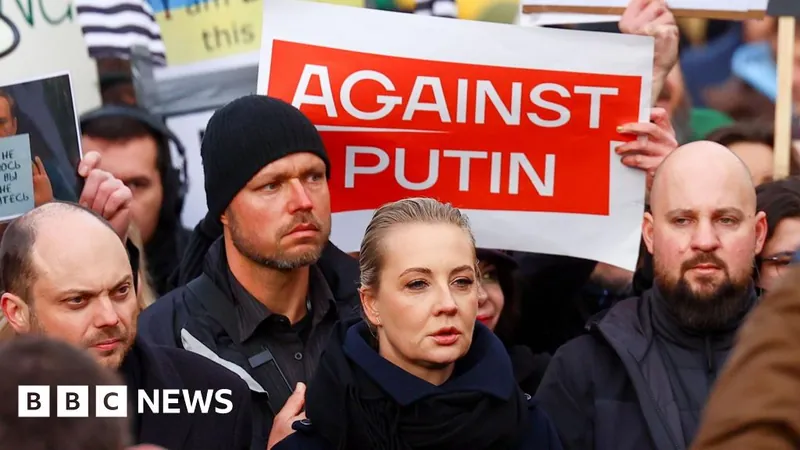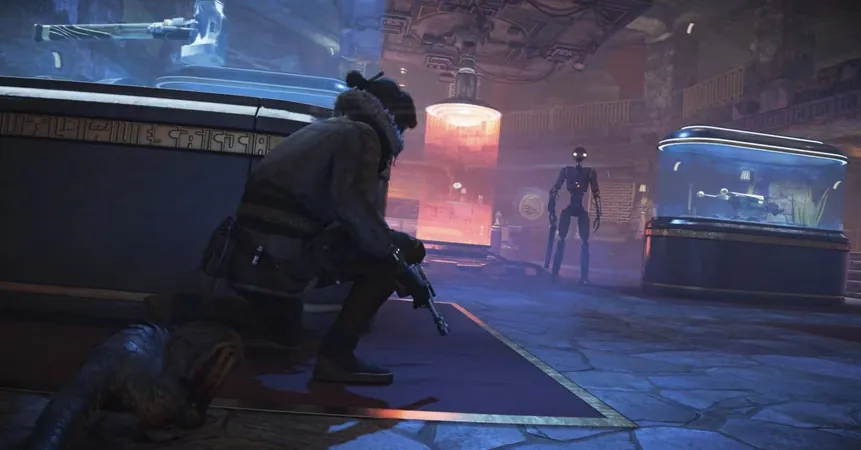
Rallying Against Oppression: Yulia Navalnaya's Powerful Plea in Berlin
2024-11-17
Author: Jessica Wong
Introduction
In a show of solidarity and resilience, Yulia Navalnaya, widow of the renowned Russian opposition leader Alexei Navalny, addressed thousands of supporters marching through the heart of Berlin. She issued a fervent call for continued protests against not only President Vladimir Putin but also the ongoing war in Ukraine.
Call to Action
“One protest alone won’t change anything. We must keep coming out, louder than before,” Navalnaya implored, leading one of the first demonstrations alongside fellow opposition figures since their exile. The atmosphere was electric, as demonstrators waved blue-and-white Russian opposition flags and Ukrainian flags, chanting powerful slogans such as “no to war” and “Putin is a killer” in their native Russian.
A Collective Voice
The march brought together a community of voices that are often silenced within Russia. Many who oppose the regime have been forced into exile due to escalating crackdowns on dissent, with the Kremlin jailing hundreds—or arguably thousands—simply for expressing their political beliefs.
Objectives of the Protest
The demonstrators listed clear objectives for their protest: a demand for the immediate withdrawal of Russian troops from Ukraine, accountability for Putin as a war criminal, and the release of all political prisoners in Russia. The focus on the war in Ukraine was especially poignant, highlighting the shared suffering felt by both Russians and Ukrainians.
Bridging Divides
This rally aimed to bridge gaps that have formed between these communities; recently, Ukrainian activists had interrupted Navalnaya’s speech in Lisbon, demanding a stronger condemnation of the war. She responded with sincerity, but the critiques revealed a lingering distrust. “We must recognize our intertwined fates and fight the oppressor together,” expressed a protester reflecting the sentiment of many present.
Voices of Courage
Among the notable figures at the march was Oleg Orlov, co-chair of the Nobel Peace Prize-winning organization Memorial, who himself had faced imprisonment in Russia for his stance against the war. Holding a poignant banner that read, “Victory for Ukraine, Defeat for Putin, Freedom for Russia,” Orlov emphasized the urgency of international support for Ukraine. He warned that a triumph for Putin would only prolong the authoritarian grip on Russia. “Those in Europe advocating for peace at all costs are paving the way for greater conflicts, potentially jeopardizing the future of Europe itself,” he asserted.
Culmination at the Embassy
The rally culminated in front of the Russian embassy on Unter den Linden, where Navalnaya and other leaders climbed atop a truck, joining hands and expressing gratitude to the supportive crowd. Their call for solidarity didn't just stop at personal convictions; Navalnaya urged attendees to march not only for themselves but also for those who cannot— for political prisoners, for the deceased, and for a brighter future.
Reflections of Dissent
Vladimir Kara-Murza, recently released from over two years of imprisonment, expressed pride in witnessing the strong turnout, despite it being smaller than anticipated. “There are millions in Russia who share our sentiments against the war and Putin’s regime," he noted. "However, dissent in Russia comes with severe repercussions.”
Conclusion
As the march drew to a close amid cheers and camaraderie, Kara-Murza condemned the Russian embassy as a “spy nest of Russia, but it will be an embassy again,” he vowed, marking a determination that resonates deeply within the hearts of those fighting for freedom and justice. This rally in Berlin is not merely an act of defiance; it symbolizes a growing chorus of resistance that persists in the face of oppression, echoing beyond borders—a testament to the undying spirit of advocacy for a democratic and peaceful future. Will this momentum continue to build? Only time will tell.


 Brasil (PT)
Brasil (PT)
 Canada (EN)
Canada (EN)
 Chile (ES)
Chile (ES)
 España (ES)
España (ES)
 France (FR)
France (FR)
 Hong Kong (EN)
Hong Kong (EN)
 Italia (IT)
Italia (IT)
 日本 (JA)
日本 (JA)
 Magyarország (HU)
Magyarország (HU)
 Norge (NO)
Norge (NO)
 Polska (PL)
Polska (PL)
 Schweiz (DE)
Schweiz (DE)
 Singapore (EN)
Singapore (EN)
 Sverige (SV)
Sverige (SV)
 Suomi (FI)
Suomi (FI)
 Türkiye (TR)
Türkiye (TR)